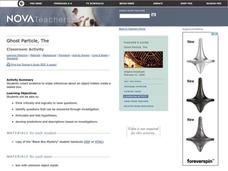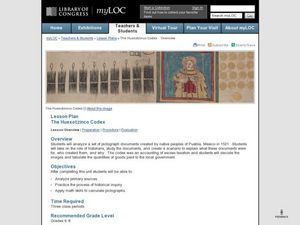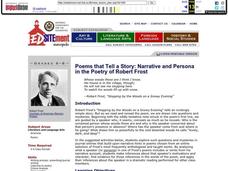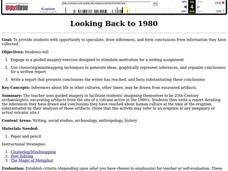Curated OER
To Question Or Not To Question?
Fourth graders practice questioning to aid in creating meaning when reading. Through guided practice, they read a passage from a chapter book and answer in-text and inference questions. Independently, they read another chapter from the...
Curated OER
Graphing Scatterplots
Pupils examine scatterplots and determine the equation of a line using the slope-intercept method. Students interpret graphs, draw inferences, and sketch a curve of best fit for the graph. Based upon patterns in the graphs, pupils...
Curated OER
The Ghost Particle
Students collect evidence to make inferences about a object hidden inside a sealed box. They think critically and logically to raise questions. Students identify questions that can be answered through investigation. They formulate and...
Curated OER
Advertising Through the Decades
Twelfth graders compare and contrast advertising styles and motives from 1920 to present. Using internet research and print advertisements students make comparisons and inferences about the function of marketing. At the culmination of...
Curated OER
Birth and Death Rates in European countries
Students discover the world as a global community and the social implications. They construct graphs to represent data, interpret diagrams and draw inferences.Students create a report, which could lead to a class discussion.
Curated OER
Newton's Laws of Motion
Sixth graders explore Newton's laws of motion with their own bodies. In this relative motion lesson students will use a wide range of materials bringing them from the concrete to the abstract on video. Students will draw inferences about...
Curated OER
The Bernoulli Effect - Conceptually
Students observe and/or conduct five experiments which address the Bernoulli Effect. For this conceptual lesson based on the Bernoulli Effect, the students construct atomizers, and make concrete observations and inferences in connection...
Curated OER
Keep it Complex
Students consider the importance of biodiversity in the ocean layers. In this oceanography lesson, students use the Shannon-Weaver diversity index to analyze data. Students analyze the information collected and write a report offering...
Curated OER
The Role of a Plantation Mistress
Students investigate the role of a plantation mistress. In this American history lesson plan, students examine the household accounts kept by Thomas Jefferson's wife. Students decide what Martha Wayles Jefferson's responsibilities may...
Curated OER
Runaway Ad - Using Primary Documents
Young scholars examine a runaway slave advertisement. For this American history lesson, students investigate a missing slave advertisement run by Thomas Jefferson in 1769. Young scholars make inferences based on the advertisement.
Curated OER
A Wolf by the Ear
Students examine Thomas Jefferson's view of slavery. In this slavery lesson, students watch segments of the video "Slavery and the Making of America." Students respond to discussion questions as they watch the video and make inferences...
Curated OER
Rockin’ the World: Rock and Roll and Social Protest in 20th Century America
Students explore protest songs. In this interdisciplinary lesson, students examine issues-based music by summarizing lyrics and revealing inferences, generalizations, conclusions, and points of view found in the songs.
Curated OER
European Agriculture
Students make inferences on how physical geography affected the development of early civilizations and come up with solutions to global issues. For this physical geography lesson plan, students compare maps of the past to maps of today...
Curated OER
Lesson PlanThe Huexotzinco Codex
Students examine primary sources that include pictographs from Puebla, Mexico. In this Huexotzinco Codex instructional activity, students perform historical analysis as they investigate the codex as they make inferences and draw...
Curated OER
Architecture of the Skeleton
Students experiment with skeletons. In this bone health instructional activity, students analyze, construct, and perform comparative investigations with bones. They make inferences about the structure and function of various bones. This...
Curated OER
The Huexotzinco Codex
Students examine primary sources and perform historical analysis. In this Huexotzinco Codex instructional activity, students investigate the codex as they make inferences and draw conclusions
Curated OER
Cherstey: What was Cherstey like in the middle ages?
Young scholars examine maps of a medieval village. In this medieval town lesson, students identify major buildings and make inferences about village life. Young scholars could draw a modern day map of medieval Cherstey.
Curated OER
Weather Olympics
Students consider the effects of topography on climate patterns. In this earth science instructional activity, students research weather patterns and make inferences of how the land forms may create different climates. Students compare...
Curated OER
Exploring Religious Violence and Persecution in 16th Century Europe
Students watch a movie on religious violence in 16th century Europe and then write a background about a picture they are given on violence. In this religious violence lesson plan, students create the background by making inferences about...
Curated OER
Look Around You
Pupils make predictions about a book they are reading and use their background knowledge to make inferences. In this predictions lesson plan, students complete a worksheet that they are given.
Curated OER
Rudyard Kipling's "Rikki-Tikki-Tavi": Mixing Fact and Fiction
"Rikki-Tikki-Tavi," from The Jungle Book, offers young readers a chance to examine how Rudyard Kipling uses setting and personification to bring to life the brave mongoose who battles cobras to protect his family. Class members explore...
Curated OER
Poems that Tell a Story: Narrative and Persona in the Poetry of Robert Frost
Pupils read and discuss poems by Robert Frost. Students collaborate in small groups to draw inferences about speakers' character and motives and to gather evidence supporting those inferences.
Curated OER
What Can We Learn From the Past?
Learners observe items from their past, making inferences and observations about their own culture based on these artifacts. Students then share with the class what they learned about their own culture, giving all learners more...
Curated OER
Looking Back to 1980
Pupils use clustering/mind mapping techniques to generate ideas, graphically represent inferences, organize their conclusions and write a report that presents conclusions the writer has reached, and facts substantiating those conclusions.
Other popular searches
- Making Inferences Worksheet
- Teaching Inference
- Inference Lesson Plans
- Observation and Inferences
- Making Inferences in Reading
- Reading Making Inferences
- Making Inference
- Inference Skills
- Observation Inference
- Making Inferences Grade 2
- Inference and Conclusions
- Making Inferences Stories

























